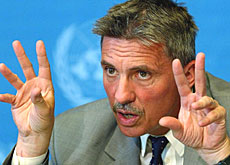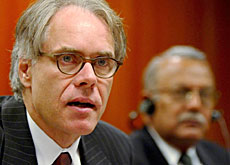Uncertainty dogs Switzerland’s first UN summit

Preparatory talks ahead of the upcoming World Summit on the Information Society (WSIS) have ended in Geneva, with deep divisions remaining on key issues.
But Switzerland, which is to host the event in December, is confident that delegates will eventually agree on a common declaration on the “information society”.
“I’m neither disappointed nor discouraged by the outcome,” the director of the Swiss Federal Office for Communication, Marc Furrer, told swissinfo.
“These are very difficult topics, such as freedom of information, financing in the less developed countries and the telecom infrastructure. This is hard work, so I would have been surprised if we had got any further,” he added.
Over the past two weeks, more than 1,600 representatives from 168 countries, the private sector, non-governmental organisations (NGOs) and civil society have been meeting in Geneva, where they had hoped to agree on both an action plan and a final declaration to be presented to government leaders in December.
According to Furrer, the delegates largely agreed on the action plan but lingering differences of opinion on the final declaration will require further discussions over the next two months.
“There will be bilateral talks and we have to negotiate with some countries on a political level,” said Furrer, who led the Swiss delegation during the prep talks.
Unique opportunity
The three-day summit, which kicks off in Geneva on December 10, aims to come up with a timetable and charter to provide equal access to information for all people around the world.
Officials and observers are hailing the event as a “unique” chance for civil society and the private sector – interest groups, academics and industry leaders – to help decide how information is used and distributed in the future.
“It used to be that governments took the decisions while civil society stood on the street and protested,” said Wolfgang Kleinwächter, who represents philanthropic institutions to the summit.
“This summit is new and we have entered a new form of communication that allows everyone to take part in the negotiations… But we’re in the very early stages of the development of a new governance model and so we have to be patient,” he added.
Maurice Strong, an advisor to the Swiss government, agrees that it will take time for the various delegations to iron out their differences and adapt to this system of negotiations, but he is confident that they will succeed.
Doom and gloom
“There are always difficulties in preparing for these conferences and in the period leading up to the event, people are always crying doom and gloom,” Strong told swissinfo. “But the ingredients for summit success are there.”
Despite the optimism, however, delegates will have their work cut out over the next two months as they try to reach a consensus on several sticking points.
A key complaint from the civil society platform is that it is not being taken seriously by governments.
According to Kleinwächter, the platform is frustrated that not enough emphasis is being placed on issues such as freedom of expression, poverty and justice for the south.
Universal access
Another bone of contention is how to finance the summit initiatives, which include providing universal access to information and communication technologies (ICTs).
Most African nations support the creation of a solidarity fund to provide new funding for ICT-related projects in developing countries.
Most industrialised nations, by contrast, want the initiatives paid for by private sector partnerships and by re-directing existing development aid, without channelling it through a new fund.
Summit officials say the issue of financing was left largely unresolved following the third preparatory meeting and will be taken up in further discussions over the next two months.
swissinfo, Anna Nelson and Frédéric Burnand in Geneva
The summit is to take place in Geneva from December 10 to 12, with a second phase in Tunisia in 2005.
The meeting’s purpose is to come up with an action plan to bridge the digital divide.
Delegates at the third preparatory meeting ahead of the summit failed to agree on a final draft declaration due to lingering differences of opinion.
Further discussions are planned to resolve divisions over issues such as financing, freedom of expression and Internet governance.

In compliance with the JTI standards
More: SWI swissinfo.ch certified by the Journalism Trust Initiative




You can find an overview of ongoing debates with our journalists here . Please join us!
If you want to start a conversation about a topic raised in this article or want to report factual errors, email us at english@swissinfo.ch.